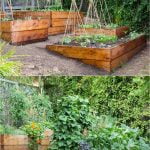Are you looking for fresh ideas to spruce up your kitchen garden? Look no further. Ellen Ecker Ogden, a renowned expert in kitchen gardens, is here to provide you with innovative and creative concepts to enhance your gardening experience. With her vast knowledge and expertise, Ellen Ecker Ogden brings a unique perspective on designing and maintaining a flourishing kitchen garden.
Ellen Ecker Ogden’s passion for kitchen gardens shines through as she shares the benefits of having one right outside your door. Imagine having an abundance of fresh herbs, vegetables, and fruits at your fingertips, ready to be picked and used in your daily cooking. Not only does a kitchen garden add beauty to your outdoor space, but it also provides you with nutritious and flavorful ingredients for your culinary creations.
In this section, we will delve into Ellen Ecker Ogden’s expertise in designing beautiful and functional kitchen garden spaces. From planning the layout to selecting the perfect plants, Ellen Ecker Ogden offers valuable tips and tricks to help you create a thriving garden that suits your needs and preferences. Get ready to transform your outdoor space into a bountiful oasis that reflects your style and culinary interests under the guidance of Ellen Ecker Ogden.
Benefits of Kitchen Gardens
Ellen Ecker Ogden, a renowned expert in kitchen gardens, has revolutionized the way we approach gardening by providing innovative and fresh ideas for creating vibrant and productive kitchen garden spaces. With her wealth of knowledge and experience, Ellen advocates for the numerous benefits that come with having your own kitchen garden. One of the most significant advantages is the convenience of having fresh herbs, vegetables, and fruits right at your fingertips.
Having a kitchen garden allows you to step outside your door and harvest ingredients for your meals, ensuring maximum freshness and flavor. Imagine plucking a handful of basil leaves or cherry tomatoes from your garden to elevate a simple pasta dish or salad.
Not only does this bring unparalleled taste to your dishes, but it also reduces the need to constantly buy produce from the store. By growing your own herbs and vegetables, you can cut down on expenses while enjoying superior quality ingredients.
In addition to the culinary benefits, kitchen gardens contribute to environmental sustainability by promoting homegrown produce over commercially grown options that may involve pesticides or long-distance transportation. Ellen Ecker Ogden’s approach emphasizes organic methods and heirloom varieties, fostering biodiversity in our gardens and supporting healthier ecosystems. Embracing a kitchen garden not only enhances your cooking but also nurtures a deeper connection with nature and a more sustainable lifestyle.
| Benefits of Kitchen Gardens | Benefits of Kitchen Gardens |
|---|---|
| Convenience of having fresh herbs, vegetables, and fruits within reach | Reduction in grocery expenses through homegrown produce |
| Promotion of environmental sustainability through organic gardening practices | Cultivation of heirloom varieties for biodiversity in gardens |
Designing Your Kitchen Garden
Designing a kitchen garden is not just about selecting plants and placing them in the ground. It involves careful planning and thoughtful design to create a space that is both functional and visually appealing. Ellen Ecker Ogden, a renowned expert in kitchen gardens, emphasizes the importance of designing your kitchen garden with intention. Here are some tips and tricks to help you plan and design a beautiful and functional kitchen garden space:
- Start by determining the layout of your kitchen garden. Consider factors such as sunlight exposure, access to water, and proximity to your home. Create a rough sketch or layout plan to visualize how you want your garden to look.
- Divide your garden into different areas or beds based on plant types or themes. For example, you could have separate beds for herbs, vegetables, fruits, and flowers. This not only adds visual interest but also helps with organization and maintenance.
- Consider incorporating features like raised beds, trellises, pathways, and seating areas to enhance the functionality and aesthetic appeal of your kitchen garden. These elements can add structure and character to your space while also making it easier to care for your plants.
Ellen Ecker Ogden encourages gardeners to get creative with their kitchen garden designs. She suggests thinking outside the box and experimenting with unique layouts, shapes, and materials to create a one-of-a-kind space that reflects your personal style and preferences. By putting thought into the design of your kitchen garden, you can create a welcoming retreat right outside your doorstep where you can enjoy the beauty of nature while harvesting fresh produce for your culinary creations.
Incorporating elements such as color-coordinated plantings, artistic arrangements, and decorative borders can elevate the visual appeal of your kitchen garden. Ellen Ecker Ogden recommends mixing edibles with ornamentals to create a harmonious blend of beauty and functionality in your outdoor space. Additionally, using vertical gardening techniques like trellises or hanging baskets can maximize limited space while adding an interesting visual element to your garden design.
Unique Planting Ideas
When it comes to creating a kitchen garden, Ellen Ecker Ogden brings a wealth of knowledge and expertise that can inspire gardeners to think outside the box. Her fresh ideas for kitchen gardens encompass a wide array of planting options that go beyond the usual herbs and vegetables. By incorporating heirloom varieties and lesser-known herbs into your garden, you can discover new flavors, textures, and aromas that will elevate your culinary creations.
One unique planting idea that Ellen Ecker Ogden often suggests is to incorporate heirloom vegetable varieties into your kitchen garden. These heirloom plants not only add visual interest with their unique shapes, colors, and sizes but also offer exceptional flavor profiles that may not be found in modern hybrid cultivars. From vibrant purple tomatoes to delicately frilled lettuces, heirloom vegetables can bring diversity and excitement to your garden harvests.
In addition to heirloom vegetables, Ellen Ecker Ogden encourages gardeners to explore the world of lesser-known herbs. While staples like basil and parsley are commonly grown in kitchen gardens, there are countless other herbs that can add depth and complexity to your dishes.
Consider planting herbs like epazote for its citrusy flavor or lovage for its celery-like taste. By experimenting with these lesser-known herbs, you can expand your culinary repertoire and infuse your meals with unexpected hints of freshness and aroma.
Companion Planting
Ellen Ecker Ogden is a well-known expert in the realm of kitchen gardens and has been inspiring gardeners with her fresh ideas for kitchen gardens. One concept that she often emphasizes is companion planting, which involves planting different species close to each other to benefit one another in various ways. Companion planting is not only practical but also environmentally friendly, as it can reduce the need for harmful pesticides and promote biodiversity in your garden.
One of the primary benefits of companion planting is pest control. By strategically placing certain plants together, you can naturally deter pests and attract beneficial insects that will help keep your kitchen garden thriving.
For example, planting marigolds alongside tomatoes can repel nematodes, while basil planted near tomatoes can improve their flavor and repel insects like mosquitoes and flies. Ellen Ecker Ogden recommends researching which plants complement each other best to create a harmonious and pest-resistant environment in your kitchen garden.
Moreover, companion planting can also improve soil health by enhancing nutrient uptake and minimizing soil erosion. Certain plant combinations help replenish soil nutrients by fixing nitrogen or breaking up compacted soil.
For instance, planting legumes like beans or peas next to heavy feeders like squash or cucumbers can enrich the soil with nitrogen naturally. By integrating companion planting techniques into your kitchen garden design, you can foster a more sustainable and productive growing space with diverse plant species working together synergistically.
| Benefit of Companion Planting | Example |
|---|---|
| Pest Control | Marigolds planted near tomatoes to repel nematodes |
| Soil Health Improvement | Beans or peas planted next to squash to enrich the soil with nitrogen |
Container Gardening
Ellen Ecker Ogden, a renowned expert in kitchen gardens, offers a wealth of fresh ideas for creating vibrant and productive kitchen garden spaces. One innovative approach she advocates for is container gardening, which allows individuals with limited space or urban dwellers to still enjoy the benefits of growing their own herbs, vegetables, and fruits. By utilizing containers, you can design a functional and attractive kitchen garden right on your porch, balcony, or windowsill.
To get started with container gardening in your kitchen garden, consider the following suggestions:
- Choose the right containers: Opt for containers that are large enough to accommodate the root systems of your plants. Make sure they have adequate drainage holes to prevent waterlogging.
- Select the right plants: Focus on herbs like basil, mint, and parsley that thrive in containers. You can also grow compact varieties of vegetables such as cherry tomatoes, peppers, and lettuce.
- Consider vertical gardening: Take advantage of vertical space by using trellises or hanging baskets to grow climbing plants like beans or cucumbers.
By incorporating container gardening into your kitchen garden design, you can enjoy a bountiful harvest even in small spaces. Ellen Ecker Ogden encourages creativity and experimentation when it comes to growing plants in containers – don’t be afraid to try new combinations or arrangements to maximize both beauty and productivity in your kitchen garden setup.
Remember that proper care is essential for successful container gardening. Be diligent about watering your plants regularly and providing them with adequate sunlight. With Ellen Ecker Ogden’s innovative suggestions for container gardening, you can transform any limited space into a flourishing kitchen garden filled with fresh produce just steps away from your kitchen.
Harvesting and Using Fresh Produce
When it comes to kitchen gardens, one of the most rewarding aspects is being able to harvest your own fresh produce. Ellen Ecker Ogden, an expert in kitchen gardens, emphasizes the importance of knowing when and how to properly harvest crops to ensure optimal flavor and nutrition. By following a few simple tips, you can make the most of your homegrown fruits, vegetables, and herbs.
Timing Is Key
Knowing when to harvest your crops is crucial for enjoying them at their peak. Different fruits and vegetables have specific signs that indicate they are ready for picking. For example, tomatoes should be harvested when they are firm but have a slight give when squeezed gently.
On the other hand, leafy greens like lettuce and spinach are best picked when they are young and tender. Ellen Ecker Ogden recommends keeping a journal or calendar to track planting dates and expected harvest times for each crop in your kitchen garden.
Harvesting Techniques
Proper harvesting techniques can help extend the shelf life of your produce and maintain its freshness. When harvesting herbs, such as basil or mint, it is best to pick leaves in the morning before the sun has warmed them up, as this is when they contain the highest concentration of essential oils.
For root vegetables like carrots and beets, gently loosen the soil around the base of the plant before pulling them out to avoid damaging the roots. Ellen Ecker Ogden suggests using sharp pruners or scissors to cut delicate herbs or greens for a clean cut that promotes regrowth.
Creative Recipes for Fresh Produce
Once you have harvested your bounty from the kitchen garden, it’s time to put that fresh produce to good use in delicious recipes. Ellen Ecker Ogden encourages home cooks to experiment with different flavor combinations and cooking techniques using their freshly picked fruits, vegetables, and herbs.
From savory herb-infused sauces to refreshing fruit salads, there are endless possibilities for creating mouthwatering dishes with homegrown ingredients. Embracing seasonality and incorporating a variety of colors and textures can elevate any meal made with produce from your kitchen garden.
Maintaining Your Kitchen Garden
Maintaining a kitchen garden is essential to ensure a continuous supply of fresh herbs, vegetables, and fruits right at your fingertips. Ellen Ecker Ogden, an expert in kitchen gardens and fresh ideas for gardening, emphasizes the importance of proper maintenance to keep your garden thriving throughout the seasons. By taking steps to manage pests and nurture healthy soil, you can enjoy a bountiful harvest year-round.
Pest Control Strategies
One of the key challenges in maintaining a kitchen garden is managing pests that can damage your plants. Ellen Ecker Ogden recommends implementing natural pest control strategies to minimize the use of harmful chemicals. Companion planting, for example, can help deter pests by creating biodiversity in your garden. Additionally, introducing beneficial insects like ladybugs and lacewings can help keep destructive bugs at bay. Regularly inspecting your plants for signs of pest infestations and taking prompt action can prevent widespread damage.
Soil Management Techniques
Healthy soil is the foundation of a successful kitchen garden. Ellen Ecker Ogden suggests enriching your soil with organic matter like compost or aged manure to provide essential nutrients for your plants. Regularly testing the pH levels of your soil can help you determine if any adjustments need to be made.
Mulching around your plants can help retain moisture, suppress weeds, and improve soil structure. Rotating crops each season can also help prevent nutrient depletion and reduce the risk of disease buildup in the soil.
Sustainable Practices
Incorporating sustainable practices into your garden maintenance routine not only benefits the environment but also ensures the long-term health of your kitchen garden. Ellen Ecker Ogden encourages using water-efficient irrigation methods such as drip irrigation or soaker hoses to conserve water and reduce waste. Implementing crop rotation practices can help naturally control pests and diseases while promoting healthy soil structure. Making use of organic fertilizers and avoiding synthetic chemicals supports a balanced ecosystem in your garden.
By following these tips for maintaining your kitchen garden from Ellen Ecker Ogden’s expertise in fresh ideas for gardening, you can create a flourishing outdoor space that provides you with an abundance of fresh produce year after year.
Ellen Ecker Ogden’s Top Tips
Ellen Ecker Ogden’s expertise in kitchen gardens and fresh ideas for gardening is truly unparalleled. Through her extensive experience and knowledge, she has revolutionized the way we think about cultivating our own food at home. Her innovative approach to design, planting ideas, companion planting, container gardening, harvesting techniques, and maintenance tips have inspired countless individuals to create their own thriving kitchen gardens.
One of the key benefits of having a kitchen garden is the sheer convenience of having fresh herbs, vegetables, and fruits right at your fingertips. Not only does this provide a constant supply of delicious ingredients for your meals, but it also allows you to savor the taste of homegrown produce that is rich in nutrients and flavor.
Ellen Ecker Ogden’s emphasis on the joy of harvesting and using fresh produce truly encapsulates the essence of what a kitchen garden should be.
From unique planting ideas to effective pest control strategies, Ellen Ecker Ogden’s top recommendations cover every aspect of creating and maintaining a successful kitchen garden. By incorporating her expert advice into your gardening practices, you can transform your outdoor space into a vibrant oasis of edible delights.
With Ellen Ecker Ogden as your guide, you are sure to embark on a rewarding journey towards cultivating a bountiful and beautiful kitchen garden that will bring joy and sustenance for years to come.
Frequently Asked Questions
How Do You Make a Small Kitchen Garden?
Making a small kitchen garden is relatively easy and can be done in various ways depending on the space available. Consider using containers, raised beds, or vertical gardening techniques to maximize space efficiency. Start by selecting suitable plants for your climate and growing conditions.
What Is a Good Size for a Kitchen Garden?
The ideal size for a kitchen garden varies depending on your needs and space available. Generally, a small to medium-sized garden ranging from 10 square feet to 100 square feet should be sufficient for supplying fresh produce for a household. It’s important to consider factors like sunlight exposure and water availability when determining size.
How to Build a Kitchen in the Garden?
Building a kitchen garden in the backyard involves several key steps. Begin by choosing a sunny location with good soil drainage. Prepare the soil by adding organic matter like compost or manure to enhance fertility.
Construct raised beds or install containers for planting vegetables and herbs. Regular watering, weeding, and monitoring for pests are essential maintenance tasks in a kitchen garden setting.

Welcome to my gardening blog! I am passionate about plants and enjoy sharing my knowledge and experiences with others. In this blog, I will write about everything related to gardening, from tips on how to get started to updates on my own garden projects.





